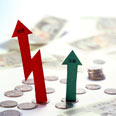
Israel turns in 6th straight quarter of growth
Gross domestic product grew annualized 3.8% in third quarter, Central Bureau of Statistics says in initial estimate, but falling exports stemming from weak US and European economies slowed rate and are expected to dampen growth into 2011
Israel's economy grew for a sixth straight quarter in the July-September period, but falling exports stemming from weak US and European economies slowed the rate and are expected to dampen growth into 2011.
Gross domestic product grew an annualized 3.8% in the third quarter, the Central Bureau of Statistics said in an initial estimate on Tuesday. A Reuters survey of nine analysts had forecast a 3.2% increase.
Growth slowed from a 4.5% pace in the second quarter but the economy has expanded at least 3.6% in every three-month period since the third quarter of 2009, as Israel rebound from a brief recession in the wake of the global financial crisis.
The Bank of Israel forecasts 4% growth in 2010, easing to 3.8% in 2011. The economy grew 0.8% to NIS 768 billion (about $210 billion) in 2009.
"The economy is very robust. We are seeing a rapid growth rate and other drivers are making up for the drop in exports, so the total economy is in pretty good shape," said HSBC economist Jonathan Katz. "Because of the soft global environment, growth may come down a notch to 3.4%."
Some analysts believe the data support another short-term interest rate increase later this month. Strong growth and high inflation expectations have already led to six, quarter-point rate increases to 2% since August 2009.
Exports
Israel's two main growth drivers – exports and consumer spending – were weak in the third quarter and resulted in a slowdown from the previous quarter. However, a jump in government spending and in investments softened the blow.
"The composition of growth was disappointing. Private consumption was very weak, exports and imports declined sharply and most of the contribution to growth came from public consumption, from investment in residential construction and from the activity of start-up companies," said Michael Sarel, head of economic research at Harel Finance.
Consumer spending slowed to a growth rate of 1.3%, mainly due to a large decline in spending on durable goods, while exports fell 9.6%.
Exports – which comprise more than 40% of Israel's economic activity – grew sharply in the prior four quarters but slipped in the third quarter due to weak US and European economies, which account for some 70% of Israeli exports.
Imports dipped 4.6% for the first decline since the first quarter of 2009.
Government spending rose 10.2% after marginal gains in the prior two quarters and investment in fixed assets increased 9.7% to continue strong gains this year following a weak 2009.
"The composition of the data shows the start of a process moving to growth based on domestic demand compared with early stages of exiting the recession that was based on higher exports," said Rafi Gozlan, an economist at Leader Capital Markets.
Bank of Israel Governor Stanley Fischer believes the country needs to base its economy more on domestic activity than exports. He has urged exporters to expand sales to faster growing markets in Asia, Latin America and Africa.
Excluding state spending, Israel's economy grew 3.9% in the third quarter, slower than a 5.1% pace in the second quarter.
Second-quarter GDP growth was unrevised at 4.5%.
- Follow Ynetnews on Facebook










